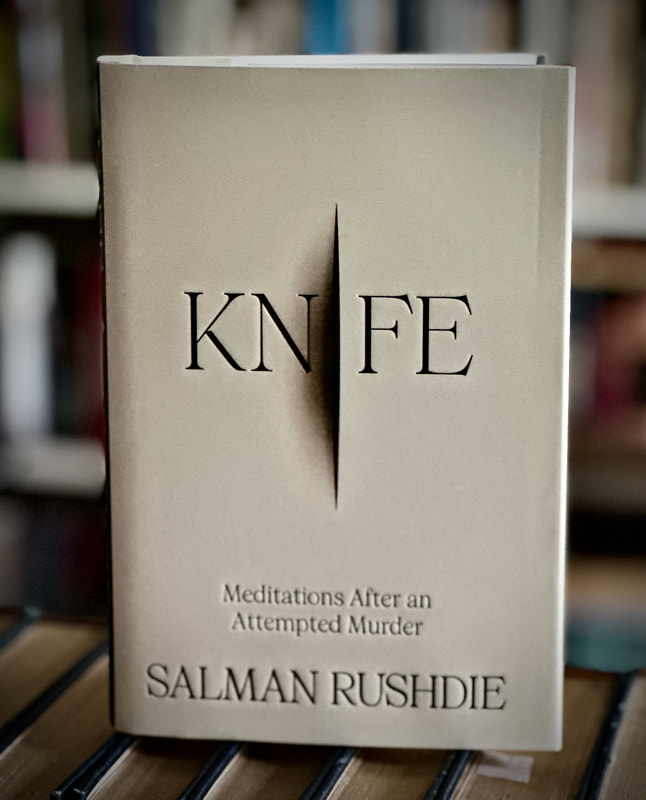Book Review | Knife5/5/2024
KNIFE: Meditations After an Attempted Murder | Salman Rushdie, Random House (2024) 224pSalman Rushdie’s "KNIFE" emerges not merely as a memoir following a profound personal crisis but as a meditative, philosophical exploration of violence, survival, and the indomitable spirit of the word against the sword. With "KNIFE," Rushdie again demonstrates why he remains one of our most crucial voices against the fascism of certainty. Rushdie’s self-reflections are neither deep nor profound. He is a much better writer than he is a thinker. His orthodox critical theory genuflections grow tiresome. But as a survivor on the front lines in the battle for free minds, he’s a hero. The book’s 224 pages are not just a recounting of the horrific attack on Rushdie but introspection and interrogation of the forces that continue to shape our discourse around freedom of speech and extremism. In "KNIFE," Rushdie’s narrative weaves through the personal and the universal, tying his near-fatal encounter to the ongoing global struggle against authoritarianism and fanaticism. His prose, as ever, is sharp, incisive, and earnest. He doesn’t just recount the event but uses it as a lens to scrutinize the nature of hate, the burden of fear, and the courage it takes to speak one's truth in the face of potential annihilation. Rushdie’s latest work is compelling in its refusal to concede to despair. His meditations on the knife, both as a physical object that nearly ended his life and as a symbol of broader cultural and religious conflicts, serve as a poignant reminder of the stakes involved in the battle for artistic and intellectual liberty. Rushdie also addresses a particularly controversial aspect surrounding the aftermath of his attack— reactions like that of ex-President Jimmy Carter, whom Rushdie correctly notes offered an undue defense of his assailant. Rushdie's engagement with Carter's stance is a rebuttal and a deeper inquiry into how narratives are shaped after violence against public figures. He questions the implications of empathizing with a perpetrator of violence and the danger of diminishing the severity of such acts through well-intended yet misdirected advocacy. The irony of Rushdie, a member of the established woke literati, getting attacked by a terrorist and then having his fellow travelers defend them does not get a robust reflection. It does not prompt Rushdie to consider that his worldview has helped radicalize, not subvert, the attacker. In conclusion, "KNIFE" is a significant cultural and literary contribution that deserves a place on the bookshelf of anyone who values the power of the written word to challenge, transform, and transcend even the most dire circumstances. OUTLINE: I. Prologue A. Introducing the attempt on the author's life B. Exploring initial reactions and emotional responses II. Part One - Before the Blade A. Background and context leading up to the incident 1. Personal achievements 2. Challenges encountered B. Establishing relationships and connections severed due to danger C. Navigating threats and fears surrounding daily activities III. Part Two - Edge of Darkness A. Physical and psychological impact of the attack B. Emotional turmoil during hospitalization and recovery C. Reflections on mortality and purpose IV. Part Three - Pieces of Self A. Struggling with identity post-trauma B. Rediscovering strengths and embracing weaknesses C. Formulating new perspectives on existence and legacy V. Part Four - Mending Fragments A. Therapeutic processes undergone B. Lessons absorbed from painful experiences C. Transformation through acceptance and forgiveness VI. Epilogue A. Resuming life with renewed vigor and appreciation B. Advocacy for empathy, tolerance, and understanding C. Final thoughts on resiliency and the human capacity to heal Book Review: KnifeComments are closed.
|
NEWSLETTER SIGNUP
Categories |

 RSS Feed
RSS Feed